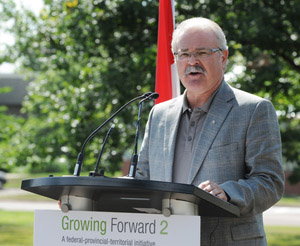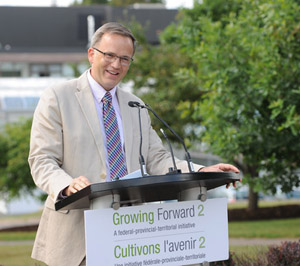If you’ve noticed the increasing shelf space labeled “organic” at your local grocery store, you won’t be surprised by the news that the organic agriculture industry is growing rapidly in Canada.
Over the past eight years, Canadians have doubled their annual spending on organic products, to the tune of $3.7 billion annually, with 58 per cent of Canadians purchasing organic products at least once a week. That makes Canada the fourth-largest organics market in the world — not to mention that the country also produces nearly $500 million in organic exports each year.
Supporting that market is a network of 4,000 farms coast-to-coast, plus 1,000 or so operators working in processing, handling and distribution. And supporting them is the Organic Agriculture Centre of Canada (OACC), hosted at Dalhousie’s Faculty of Agriculture. The centre plays a leadership role nationally through its scientific research and education, serving the interests of both farmers and consumers while considering environmental sustainability and animal welfare.
Investing in organic agriculture
As part of its work, the OACC hosted the Organic Science Cluster, a five-year industry-supported research and development endeavour in collaboration with the Organic Federation of Canada and funded by the Government of Canada. Tuesday afternoon, federal Agriculture Minister Gerry Ritz was in Truro on the ∫⁄¡œ≥‘πœÕ¯Agricultural Campus to announce its sequel: the Organic Science Cluster II (OSCII), part of Agriculture and Agri-Food Canada‚Äôs Growing Forward 2 framework.
 ‚ÄúOrganic farmers are looking to science more than ever before,‚Äù said Minister Ritz, announcing the cluster, which includes $8 million from Agriculture and Agri-Food Canada alongside a $2.7 million commitment from industry partners. ¬Ý
‚ÄúOrganic farmers are looking to science more than ever before,‚Äù said Minister Ritz, announcing the cluster, which includes $8 million from Agriculture and Agri-Food Canada alongside a $2.7 million commitment from industry partners. ¬Ý
“This investment continues to bring the best and brightest together — from academia, government and industry — to focus on cutting-edge research that will ultimately grow markets for our organic producers and processors.”
Like its predecessor, the research cluster will be managed by the OACC at ∫⁄¡œ≥‘πœÕ¯on behalf of the Organic Federation of Canada. It will involve more than 200 scientists and graduate students across the country, looking at ways to improve crop breeding, enhance soil to improve plant health, and develop new approaches to managing crop pests and diseases as well as livestock parasites.
“We will have researchers from across Canada helping us improve the yield of our crops, recycle our resources, have better control of our weeds, take better care of our farm animals, in order to offer quality food to Canadian consumers and consumers in countries where our organic products are exported,” said Tim Livingstone, speaking on behalf of the Organic Federation of Canada.
Projects to help farmers and industry
The OACC will be administering the cluster’s funding across 37 projects at 36 research institutions across Canada: universities, Agriculture and Agri-Food Canada research stations, and others.
Two of the projects will be led by researchers at the Faculty of Agriculture. Chris Cutler of the Department of Environmental Sciences will explore the potential for plant oils to be used as biologically-friendly pesticides for blueberry crops.
“I’m an entomologist, and I do a lot of work in crop protection and sustainable, ecological methods of controlling pests without harming the environment,” said Dr. Cutler. “We’ll be testing several of these bio-pesticides against insect pests in blueberries, and look for combinations of these pesticides to see if we can get extra efficacy.”
A second ∫⁄¡œ≥‘πœÕ¯project will be led by Derek Lynch, Canada Research Chair in Organic Agriculture. It will bring together researchers from four provinces, as well as industry partners, to look at ways to optimize green manure and fertility management for organic cereal production. The project will also allow for testing new reduced tillage techniques across differing agroecosystems in Canada.
Andrew Hammermeister, director of the OACC, explained that the cluster’s research projects are spread across five themes: field crops, horticultural crops, pest management, livestock and value-adding.
“From the beginning of this cluster, our goal was to facilitate excellence in industry-led science that will enhance the sustainability and competitiveness of our sector,” he said. “This announcement is the culmination of over two years of work, identifying research priorities, screening applications for industry relevance and reviewing the proposals in a scientific peer-review process. We also wanted to make sure this research was impactful for industry, and we had industry participation throughout the process.”
A spirit of collaboration
Along those lines, the cluster is supported by over 65 contributing partners from industry who have committed over $2.7 million in cash and in-kind funding toward OSCII. Much of the research will be carried out with the collaboration of industry partners on farms, in greenhouses and at processing facilities.
 “[The OACC] embodies the three pillars of our mission: the teaching and learning, the experience of those students; great groundbreaking research; and service to our communities through partnership, making a big impact on the lives of Canadians and people around the world,” said Dal President Richard Florizone.
“[The OACC] embodies the three pillars of our mission: the teaching and learning, the experience of those students; great groundbreaking research; and service to our communities through partnership, making a big impact on the lives of Canadians and people around the world,” said Dal President Richard Florizone.
Other speakers at the event, held in the Agricultural Campus’ outdoor amphitheatre, included Cumberland-Colchester MP Scott Armstrong and David Gray, dean of the Faculty of Agriculture and campus principal, who served as master of ceremonies. Provincial Agriculture Minister Keith Colwell was also in attendance.

